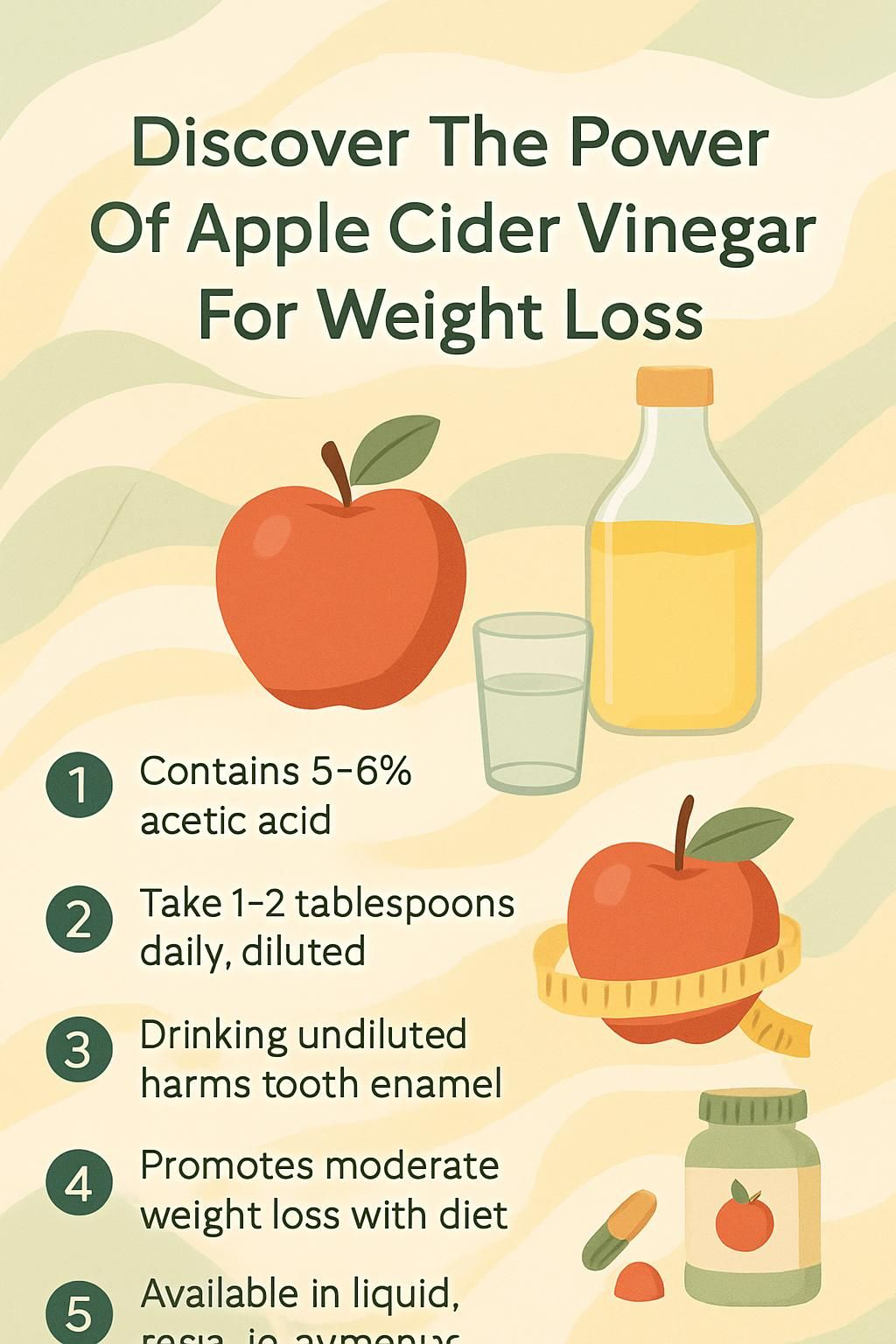Discover The Power Of Apple Cider Vinegar For Weight Loss
Our Nutrition Assistant AI Suite will transform your body. You will lose fat, get toned, and build muscle. Gain confidence and optimal health.
Trying to drop extra weight and want something simple to add to your routine? Many people use apple cider vinegar for weight loss as a small daily habit. This guide explains what ACV is, how it might help, and how to use it safely. You will also see easy recipes, key studies, and clear precautions.
Key Takeaways
- Apple cider vinegar contains 5 to 6 percent acetic acid. A 2009 Japanese placebo-controlled study in overweight adults showed modest weight loss and smaller waist size over 12 weeks.
- Typical research doses range from 1 to 2 tablespoons, 15 to 30 milliliters, daily. Diluted in water, ACV may curb appetite, smooth blood sugar spikes, and reduce LDL cholesterol and triglycerides in small studies.
- Never drink ACV straight. Undiluted acid can erode tooth enamel, upset digestion, and interact with some medicines. Talk with a clinician if you use diabetes drugs or diuretics.
- Evidence reviews, including one published by BMJ Open in 2018, suggest only moderate benefits. Results are best when paired with a balanced diet and regular activity.
- ACV comes as liquid, capsules, and gummies. Liquid usually provides more acetic acid. Gummies often deliver less and may include added sugars.

Overview of apple cider vinegar (ACV) and its growing popularity in weight loss
Apple cider vinegar has become common among people trying to manage weight. Many mix one or two tablespoons with water and drink it before meals.
Interest grew after small clinical trials linked ACV to lower body weight, body fat, and waist circumference over 12 weeks. One trial with 120 overweight adults reported greater weight loss and a lower body mass index compared to a control group.
For those seeking natural tools, ACV appears often in healthy living posts. People use it to help with appetite control and fat storage, though results vary.
Because overweight and obesity affect many families, ACV drinks, capsules, and gummies are now part of some daily routines. They work best alongside smart eating and steady movement.
Importance of understanding its benefits and proper usage
You get more from ACV by using it correctly. Studies, including a BMJ Open paper from 2018, show that 30 milliliters of acetic acid daily over 12 weeks led to modest weight loss versus a control group.
Improper use can harm teeth or irritate your stomach. Most experts suggest one to two tablespoons per day, diluted in water or used in a salad dressing. Gummies and capsules can work, but strength varies by brand.
I started with one teaspoon in water before lunch. It reduced snacking and helped me feel satisfied. Using ACV safely may support digestion and steadier blood sugar levels while avoiding side effects.
What is Apple Cider Vinegar?

Apple cider vinegar is a fermented juice made from crushed apples. It contains acetic acid and trace nutrients that may support weight control when part of a healthy routine.
Description and production process of ACV
Producers crush apples to make juice, then add yeast. The yeast turns the natural sugars into alcohol. In the next stage, acetic acid bacteria change that alcohol into acetic acid, which gives ACV its sharp taste and smell.
Some bottles contain a cloudy strand called the “mother.” It includes proteins, enzymes, and friendly bacteria. Many shoppers prefer ACV with the mother for potential extra benefits.
You can buy ACV as a liquid or in capsules and gummies for convenience.
Fermentation is a natural way to preserve food and adds potential health benefits to your diet.
Nutritional components: acetic acid, vitamins, and minerals
Acetic acid is the main active compound. It may promote fullness and reduce post-meal blood sugar spikes. One tablespoon has about three calories, with almost no fat, fiber, or protein.
- Vitamins: small amounts of vitamin C and B vitamins that support immune function and energy.
- Minerals: trace potassium for blood pressure and muscle function, plus tiny amounts of calcium, magnesium, and phosphorus.
This mix supports general wellness, but ACV is not a broad multivitamin. It is a low-calorie flavor tool that may offer modest metabolic effects.
Different forms of ACV (liquid, capsules, gummies)
Liquid ACV is versatile. People add it to water or use it in recipes, and it usually contains 5 to 6 percent acetic acid.
Capsules offer a taste-free option and reduce contact with teeth. Gummies are easy to carry and have a mild flavor, but they often include less acetic acid and sometimes added sugars.
Choose the form you will use consistently. Check labels for acetic acid content so your dose matches what research suggests.
How Apple Cider Vinegar Aids in Weight Loss
Think of ACV as a small nudge that supports your larger plan. It is not a quick fix.
Mechanisms of action: appetite suppression, fat storage reduction
ACV may help you feel fuller, leading to fewer calories eaten later in the day. Researchers believe acetic acid influences hunger signals in the brain.
Some studies suggest ACV can reduce fat storage by affecting genes linked to fat burning. Trials in people with overweight found improved waist measurements, which supports long-term weight management goals.
Role of acetic acid in improving metabolism
Acetic acid appears to help your body use fat for energy. Research doses of 15 to 30 milliliters per day have been associated with better fat breakdown in adipose tissue, the body’s fat stores.
It may also improve fasting blood glucose and insulin sensitivity, two factors tied to type 2 diabetes. In several small studies, daily ACV was linked with lower waist size and body fat percentages.
These effects are modest, yet they can support the rest of your plan, especially if you also focus on food quality and movement.
Scientific studies supporting its weight loss claims
In a 2009 Japanese study, people with overweight drank one or two tablespoons of vinegar mixed with water daily. After 12 weeks, the vinegar groups showed lower body weight, smaller waists, and less body fat than the control group. Other research points to lower triglycerides, an important marker for heart health.
Some hospital-based teams, including those at Beth Israel Deaconess Medical Center, have explored how vinegar may reduce appetite and blunt blood sugar spikes. I tested one tablespoon before dinner for a month and noticed fewer evening cravings.
Taken together, results show small but meaningful changes, especially with steady diet and exercise habits.
Health Benefits of Apple Cider Vinegar
ACV will not do the work for you, yet it can support several health goals.
Improved digestion
ACV can support healthy gut bacteria, which may reduce bloating and aid digestion. Some people feel lighter after meals when they use a small diluted dose.
ACV may slow stomach emptying. That can reduce blood sugar spikes, but it may worsen symptoms in those with gastroparesis, especially people with type 1 diabetes. If you have this condition, ask your clinician before using ACV.
Small daily amounts may also help your body handle starch, which can support weight management efforts.
Blood sugar regulation
Several small trials show ACV can reduce post-meal blood sugar spikes. Doses of 1 to 2 tablespoons per day have been linked to improved insulin sensitivity in people with overweight.
Acetic acid slows how quickly sugars leave the stomach and enter the bloodstream. Many users report steadier energy and fewer sugar cravings. Long-term effects need more research, so take a cautious approach and track your response.
Heart health and cholesterol control
Limited research suggests ACV may lower total cholesterol, LDL cholesterol, and triglycerides. These changes support heart health, especially for people working on weight and blood pressure.
Because ACV’s impact is moderate, pair it with proven steps like fiber-rich foods, regular exercise, and enough sleep.
Ways to Incorporate Apple Cider Vinegar into Your Diet
Start simple and keep it consistent.
Recommended dosage and consumption tips
- Begin with 1 to 2 teaspoons diluted in a large glass of water once daily.
- If well tolerated, consider 1 to 2 tablespoons per day total, split with meals, based on research ranges.
- Always dilute. Use a straw to limit contact with tooth enamel.
- Take ACV with food to reduce stomach discomfort.
- If using capsules or gummies, check acetic acid content and follow the label.
If you have reflux, low potassium, kidney concerns, or take medicines for diabetes or hypertension, get medical guidance first.
Recipes for drinks and meals featuring ACV
- Simple drink: mix 1 to 2 teaspoons ACV in water. Add a squeeze of lemon or a small amount of honey for taste.
- Everyday dressing: whisk 1 tablespoon ACV with 2 tablespoons olive oil, plus salt, pepper, and garlic powder. Serve over greens or roasted vegetables.
- Light marinade: combine ACV with herbs and a little oil for chicken or tofu. Marinate for 30 minutes, then grill or bake.
These options let you use apple cider vinegar in normal meals without extra calories from heavy sauces.
Potential Side Effects and Precautions
ACV is an acid. Respect the dose and protect your teeth and stomach.
Risks of excessive consumption
High amounts can erode tooth enamel and irritate your throat. Some people report nausea or stomach pain when they take too much liquid ACV.
ACV may lower potassium, which can be risky if you already have low levels or take certain diuretics. Large doses can also disrupt blood sugar control.
I once tried to increase my daily dose to speed results. Instead, I felt dizzy and developed heartburn. Small, steady amounts worked better.
Summary: Excess ACV can damage teeth, upset the stomach, change electrolyte balance, and affect some medicines. Use it in moderate amounts and as part of a balanced plan, under medical guidance.
Interactions with medications (e.g., diabetes medications)
ACV can enhance insulin sensitivity and lower blood sugar. If you take insulin or metformin, levels could drop too low and cause hypoglycemia. Those on diuretics or certain heart medicines should also be cautious because ACV can affect potassium and blood pressure.
If you use ACV alongside prescriptions, monitor your readings and discuss your plan with a healthcare professional.
Personal Success Stories and Testimonials
Real stories can motivate change, yet they do not replace medical advice.
Real-life experiences of individuals who have successfully used ACV for weight loss
One reader from Arizona mixed two tablespoons of ACV with water before meals. Over three months, she reported fewer cravings and lost eight pounds while eating more mindfully.
Another person added a daily ACV drink plus walks and smaller portions. He credited these steps with a 15-pound loss in four months. Most people who succeed pair ACV with diet changes and regular activity.
Before-and-after transformations and motivational insights
Several users share photos showing steady change after adding ACV to balanced meals and exercise. One woman reported losing 25 pounds in five months using two teaspoons every morning and improving her food choices.
A 2009 study supports these modest outcomes. Participants who used vinegar daily lost more body fat than those who did not. My own eight-week trial produced small fat loss and better meal satisfaction.
Complementing ACV with a Healthy Lifestyle
Think of ACV as a supporting player in a bigger plan.
Importance of a balanced diet and regular exercise
Balanced meals provide the nutrients your body needs. Focus on lean proteins, whole grains, fruits, vegetables, and healthy fats. Limiting added sugars and refined carbs helps control calories and cravings.
Regular exercise, such as brisk walking or cycling, boosts metabolism and preserves muscle while you lose fat. The combination of smart eating and movement produces the most reliable progress over time.
Combining ACV with other weight loss strategies
- Use diluted ACV with meals and track intake with a simple food log.
- Eat protein at breakfast to curb hunger later in the day.
- Drink enough water, which supports digestion and helps control appetite.
- Set realistic weekly goals and check progress with a tape measure and scale.
- If you choose capsules or gummies, watch for added sugars and confirm the acetic acid amount.
- Limit alcoholic drinks to avoid unwanted calories and blood sugar swings.
Discuss any new supplement with your clinician, especially if you have diabetes, hypertension, kidney issues, or take multiple medications.
Debunking Common Myths About Apple Cider Vinegar
Good science beats catchy claims.
Separating fact from fiction
ACV does not melt fat overnight or cure diseases like tuberculosis. Research shows modest support for weight loss, blood sugar control, and cholesterol markers. Benefits appear when ACV joins a healthy diet and exercise plan.
Some online posts overstate ACV’s power. Look for peer-reviewed studies and credible medical sources before making changes.
Addressing misconceptions and exaggerated claims
Some ads promote huge weekly losses or push very high doses. That is risky and not supported by research. In the 2009 study, average weight loss was about 2 to 4 pounds over 12 weeks with daily vinegar use.
I began with half a tablespoon in water before meals. Within two weeks, cravings eased and portions felt easier to manage. If you shop online for ACV products or recipes, protect your email and personal data by choosing trusted retailers.
Conclusion
Small, steady habits add up over time.
Recap of the benefits and practicality of using ACV for weight loss
Apple cider vinegar may help with appetite control, post-meal blood sugar, and cholesterol markers. Several small studies report modest drops in body weight and waist size with daily use. It is easy to add one to two tablespoons to water, salad dressings, or light marinades.
Keep doses moderate and always dilute to protect tooth enamel and the gastrointestinal tract. ACV works best with a healthy diet, regular exercise, and enough sleep.
Encouragement for readers to consult with healthcare professionals before starting any new weight loss regimen.
Before adding ACV or changing your routine, speak with a healthcare professional. This is especially important if you take insulin, metformin, or diuretics, or if you have kidney issues, reflux, or low potassium.
This article is for education and is not medical advice. Professional guidance helps you use ACV safely and improves your chances of steady, lasting progress.
FAQs
1. How does apple cider vinegar help with weight loss?
Apple cider vinegar may support weight loss by increasing feelings of fullness and reducing calorie intake. Some studies suggest it can help regulate blood sugar and improve metabolism, which may aid in fat reduction. For example, a 12-week study found that people who consumed one to two tablespoons daily lost more weight than those who did not use it.
2. What is the recommended amount of apple cider vinegar for weight loss?
Most research recommends taking one to two tablespoons of apple cider vinegar mixed with water each day. It is important not to exceed this amount because higher doses can cause digestive discomfort or harm tooth enamel.
3. Are there any risks or side effects when using apple cider vinegar for weight loss?
Apple cider vinegar is safe for most adults when used as directed; however, it can cause stomach upset, throat irritation, or lower potassium levels if overused. People with certain health conditions should consult a healthcare provider before starting regular use.
4. Can I share a personal experience about using apple cider vinegar for weight loss?
After adding diluted apple cider vinegar to my morning routine, I noticed I felt less hungry before lunch and made healthier food choices throughout the day. While results vary by person, combining it with balanced meals and regular activity improved my progress over several weeks.
Summary: Apple cider vinegar may help with weight management by promoting fullness and supporting healthy habits when used safely and as part of a balanced lifestyle. Research supports its benefits but highlights the need for moderation and medical guidance if you have health concerns.







